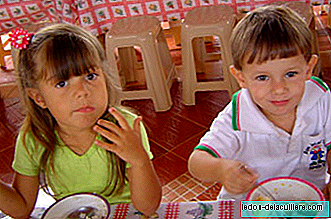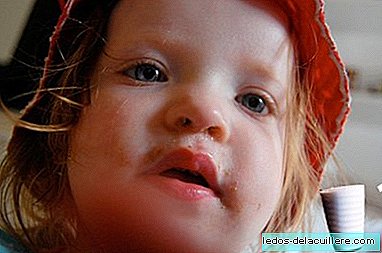
Eating a vegetarian diet becomes an option that can be quite healthy for adults who follow it conveniently, in an informed and balanced way.
However, taken to the extreme or without control can present nutritional deficiencies that have to be supplemented by vitamin and nutritional supplements to avoid health problems. If this is so in adults, Is the vegetarian diet suitable for children?
According to different consensus documents and international organizations, a vegetarian diet for children from six months of age entails risks of being insufficient in terms of nutrients necessary for young children. The risk increases especially in vegan (strict vegetarian) diets, which exclude any food of animal origin.
We have to take into account that the child in the first years of life establishes the bases, the organic foundations of a holy and adequate growth, so you have to take care of your diet at this crucial stage. Let's see what health authorities say about this issue.
The recommended standards for the European Union regarding "Feeding infants and young children" This is determined in one of its sections, warning of health risks, including malnutrition, rickets or stunted growth of infants and children in extreme cases.
This is a document prepared with the collaboration of different medical and nutrition agencies and that is part of the EU-funded EUNUTNET project, which aims to ensure the development and implementation of coherent evidence-based training and nutrition promotion strategies and physical activity.
In the section dedicated to complementary feeding after six months we find an analysis of the different degrees of vegetarianism and the main deficiencies they present:
Vegetarian diets exclude, to varying degrees, animal products; Vegans exclude them all. The main concern regarding these diets is the small but considerable risk of nutritional deficiencies. These include iron, zinc, riboflavin, vitamin B12, vitamin D and calcium (especially in vegans) and insufficient energy intake. These deficiencies are greater in situations where there is an increase in needs, such as in infants, children and pregnant or nursing women. Although the inclusion of animal products does not automatically ensure an appropriate diet, it is easier to achieve a balanced diet with them than without them. A vegetarian diet with eggs, milk and derivatives provides high quality protein and also provides enough B vitamins and calcium. Problems can occur with vegan diets. Infants and young children (6- 24 months) fed these diets must receive a wide variety of vegetable proteins; Each meal should contain two complementary sources of these proteins, such as legumes accompanied by wheat, or rice with lentils. Very restrictive or macrobiotic vegan diets (restrictive vegetarian diet associated with loyalty to natural and organic foods) can cause serious adverse effects and should be discouraged during the complementary feeding period. They carry a high risk of nutritional deficiencies and have been associated with protein-energy malnutrition, rickets and stunted growth and psychomotor development in infants and children.
These recommendations have already been supported by many European and international professional associations, by important non-governmental organizations and by the European Regional Office of the World Health Organization.

For its part, the Spanish Association of Pediatrics (AEPed) It contains in its "Practical Manual of Nutrition in Pediatrics", a section dedicated to "Non-omnivorous diets in pediatric age. Alternative diets: vegetarian".
Here the different advantages and disadvantages of the different vegetarian diets are analyzed, as well as the contributions of the fundamental nutrients that are diminished with this type of diets and the best way of supplying them to avoid problems.
The absence or low content of some nutrients in the various vegetarian diets forces them to adapt them so that they are sufficient from the maternal cloister to adolescence. Admittedly, while the design of these diets takes time, they can also create beneficial habits for health throughout life.
In this document, professionals are very well oriented to determine the degree of vegetarianism that parents follow and want their child to follow, so that there are no risks. It can also be very useful for parents who want to find out about the most necessary compensation and to consult links of interest.
Regarding the growth of children fed through these restrictive diets, we have to:
Ovolactovegetarian children grow up like omnivores, vegans at a slower speed during the first five years, but rarely have rickets. These, which are slightly smaller than the omnivores, are regaining height in school age probably due to a higher caloric intake. Macrobiotics, those who only eat fruit and those who eat only raw vegetables have insufficient growth, even before the end of the year, similar to the malnourished in the third world and marginal in the big cities. If the child does not grow as expected it will be in most cases due to lack of energy in the diet, so it will be necessary to increase its content, giving more foods with fat such as vegetable oils, margarine, seed butter, nuts and avocados.
Finally, in the "Guiding principles for complementary feeding of the breastfed child", from WHO, reminds us that meat, poultry, fish or eggs should be consumed daily, or as often as possible, as they are rich sources of key nutrients such as iron and zinc. Similarly, dairy products are rich in calcium and other necessary nutrients:
NUTRITIONAL CONTENT OF COMPLEMENTARY FOODS. Give a variety of foods to make sure you meet nutritional needs. Meat, poultry, fish or eggs should be consumed daily or, if not possible, as frequently as possible. Vegetarian diets fail to meet nutritional needs at this age, unless nutritional supplements or fortified products are used.
At this point, the conclusions are similar in the Guiding Principles for non-breastfed children.
In short, we see that, according to different international health and pediatric organizations, a vegetarian diet would not be suitable for children, unless the associated deficiencies are overcome, especially if they are strict vegetarian diets.












